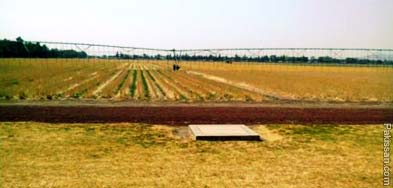CIMMYT to provide 78 wheat
varieties to BARI
Maryam
Naseer
Publications Officer, PARB
 Under
a Punjab Agricultural Research Board (PARB) funded project,
wheat varieties are being collected from world renowned body
to cultivate on trial basis in the Punjab province. Dr.
Tariq Director Barani Agriculture Research Institute (BARI)
Chakwal, visited International Wheat and Maize Improvement
Centre (CIMMYT), Mexico under the PARB-funded project
entitled “Development of nutrient use efficient wheat
germplasm for food security in rainfed areas of Pakistan”.
Under
a Punjab Agricultural Research Board (PARB) funded project,
wheat varieties are being collected from world renowned body
to cultivate on trial basis in the Punjab province. Dr.
Tariq Director Barani Agriculture Research Institute (BARI)
Chakwal, visited International Wheat and Maize Improvement
Centre (CIMMYT), Mexico under the PARB-funded project
entitled “Development of nutrient use efficient wheat
germplasm for food security in rainfed areas of Pakistan”.
During the visit wheat selections were also carried out from
the advanced elite wheat material sown in the experimental
station Obregon. Seventy eight advance lines were selected
on phenotypic basis, which will be provided to BARI, Chakwal
after harvesting for further testing in the barani as well
as irrigated areas of Punjab.
Last year CIMMYT launched the wheat program on
micronutrients like Zn and Fe for the biofortification to
combat the malnutrition in the South Asian countries. “In
future we will collaborate with CIMMYT to get the
micronutrient based developed nurseries and will utilize it
for breeding program to develop the nutritionally enriched
wheat varieties,” Dr. Tariq added.
Dr. Tariq observed that in order to address the issue of
edible oil import in Mexico, the Government has suggested to
plant safflower crop. Many farmers are cultivating this crop
and according to them being a hard and drought tolerant crop
they also get more economical gain as compared to wheat.
“Seed of five varieties of safflower has also been brought
to conduct experimental/adoptability studies in the low rain
fall areas of rainfed tract”.
CIMMYT is focusing on the agriculture conservation by
utilization of resources. In rainfed areas the crop is
irrigated through the high efficient irrigation systems like
the sprinkler and drip. The most important aspect of
conservation agriculture is that all the crops (wheat,
maize, sorghum, safflower and soybean) are being cultivated
on raised bed with residues of the previous crops. Moreover
many farmers are using sprinkler irrigation for wheat and
safflower crops. Majority of the farmers asses the crop need
for nitrogen fertilizers (urea) through the facility of
remote sensing provided by the farmers union (cooperative)
at cost of US$ 6/ha, and are saving 20-30% expenditure on
nitrogen fertilizers and reducing the environmental
pollution.
Many training activities were being carried out includes
field visit of Sonora valley having 341 tube wells installed
along the main canals which were centralized through
satellite. These tube wells pump out the water and put it
into the main canal which provides water to the farmers’
field. District Government charges 52 US $/ha for irrigation
per annum.
The average wheat yield of the valley is 6.2 tones/ha but
the majority is getting 7 to 8 tones/ha. This wheat is
exported to the developed countries especially USA to get
the foreign exchange. TheThe next visit was to Obregon,
experimental station of CIMMYT. On this experimental station
the scientist develop about 2000 wheat crosses per year for
the varietal development among which 40% are rejected at the
F1 stage and 20 ha area is under the F2 population.
CIMMYT target is 2% annual yield increase through the
agronomic practices. Demonstration was given on different
wheat nurseries regarding to the rust resistance, kernel
bunt, fusarium, stem rust Ug-99, heat tolerance, wheat
quality and the development of early maturing varieties.
CIMMYT is also taking the observations on the Pakistani
germplasm like, Inqilab-91, Pak-81 and Mexipak. CIMMYT is
running the synthetic wheat program to develop the new
diversity in the elite cultivated wheat varieties.
The participants were also showed the conservation based
cropping systems and management, raised bed technology, zero
tillage sprinkler irrigation and water conservation,
assessment/diagnosis of nitrogen fertilizer through remote
sensing which is an efficient fertilizer application method
help to save 20% fertilizer.
The new intervention in the CIMMYT is the cultivation of
safflower due to water shortage and to mitigate the edible
oil import. Farmer Association purchases the farmers yield
and ensure the payment in time. The farmers chop the stalk
in the field which improve the soil nutrient status and
beneficial for soil conservation and water retention.
The visit was very fruitful and learned a lot regarding the
wheat selection from the segregating populations, rust
scoring and best ideotype selections, crop agronomy and
conservation agriculture.